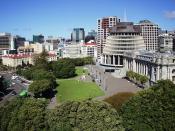The first words of Sweden's constitution, the Grundleg, state that all public power in Sweden comes from its people. This is very obviously saying that Sweden is a democratic nation. This democracy is based on parliamentarism, meaning that confidence and support from the parliament, the Riksdag, are required for making all major decisions. If the cabinet (sometimes called simply the Government) does not receive support from a majority in the Riksdag then it may be forced to resign before its term has expired. This parliamentary system has been unicameral since 1970 and contains 349 members. These members are elected every four years. These three details (Grundleg, Riksdag, and the democratic system) are the basis of Sweden's political system. Nearly all of its politics can be traced back to these basic principles.
The Grundleg is split into four different laws. They are called the Instrument of Government (Regeringsformen), the Act of Succession (Successionsordningen), the Freedom of the Press Act (Tryckfrihetsforordningen), and the Fundamental Law on Freedom of Expression (Yttrandefrihetsgrundlagen).
These laws serve as a basis for how Sweden is ruled. They also serve to protect the citizens' freedoms and rights and were revised from their original rendition in 1975 in order to keep up with changed issues.
The Instrument of Government contains much valuable information. As I have stated it starts with the statement, "All public power in Sweden proceeds from the people."� Another statement in the Instrument of Government is, "The king or queen who occupies the throne of Sweden in accordance with the Act of Succession shall be the head of state."� This tells us that Sweden is still technically a monarchy and the king is the Kreifels 2 head of state but he no longer holds any authority in the governing of the state. His task...


